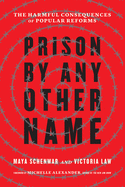
"The book you hold in your hands requires your full attention," writes Michelle Alexander (The New Jim Crow) in the foreword to Prison by Any Other Name by journalists Victoria Law and Maya Schenwar. Truer words have never been spoken. Law and Schenwar make an impassioned case for how popular prison reforms are actually expanding, not shrinking, the state of mass incarceration in the United States--research that is as important as it is timely.
The United States remains "the most incarcerated nation," with roughly 2.3 million people currently held behind bars. Costing a staggering $182 billion per year, it comes as no surprise that Law and Schenwar are able to point to the many instances of bipartisan support for prison reform. But these reforms--including electronic monitoring, house arrest and extended probation--have expanded the concept of incarceration beyond the bounds of the physical prison: "From unremitting 'treatment' requirements to the stifling protocols of the sex offender registry, many of the structures outside of prison [bear] uncanny resemblances to the prison itself: control, punishment, and a constant reminder that your body is not your own--that once the system has you in its clutches, you are the state's to manipulate."
This forms the crux of Law and Schenwar's argument, as they expound on the myriad ways that prison reforms are stretching the boundaries of incarceration in the United States. Drawing on statistics, detailed research and personal anecdotes from people whose lives have been affected by incarceration, Prison by Any Other Name is both eye-opening and challenging. Encouraging readers to center the human lives caught in the broken, racist system in place today, this is crucial reading for anyone with a mind for justice. --Kerry McHugh, freelance writer

